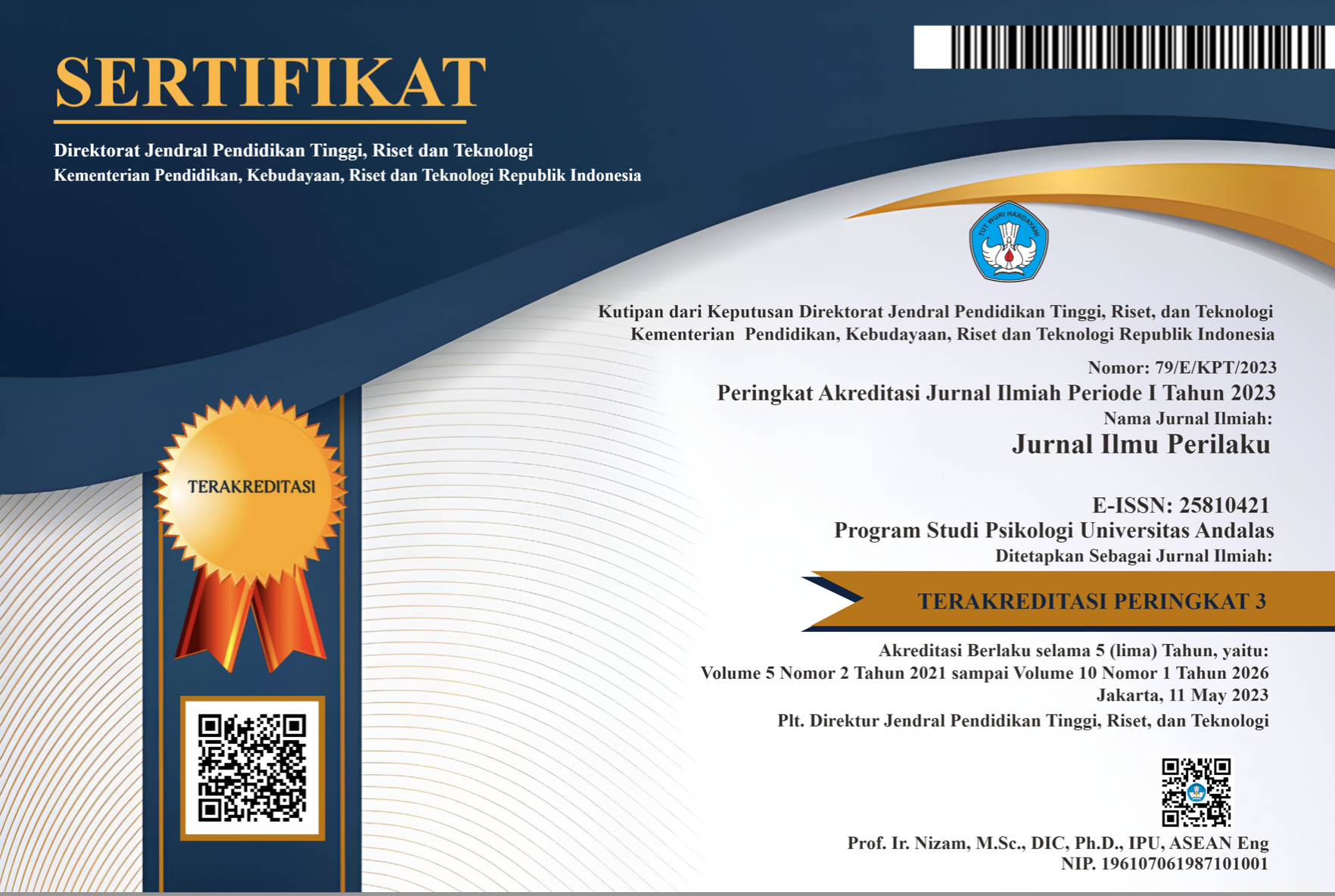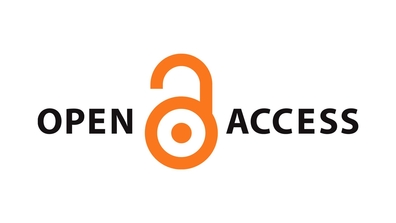Studi Fenomenologis tentang Fatherless pada Narapidana Perempuan
Abstract
Fatherlessness is a phenomenon that can have various negative impacts on children's development into adulthood. The absence of a father's role, especially for women, means that individuals do not have appropriate role models in enforcing discipline and implementing principles. This can become problematic behavior and has the potential to lead to crime. This research aims to explore the image of fatherlessness among female prisoners. This research uses a qualitative research method with a phenomenological approach involving several women who are prisoners at the class IIA Palembang Penitentiary. Semi-structured in-depth interview methods, unstructured observation, and member checking. Data obtained from the field will be analyzed using interpretative phenomenological analysis (IPA) techniques. The results of this research found main themes: lack of affection, longing for a father figure and hope for family unity.
Downloads
References
Arini, D. P., Kristianto, C., Pramudito, A. A., Hardiyatmoko, H. F., Viona, R., & Damanik, I. R. (2022). Psikoedukasi online mengenai kesehatan mental dan pemberitaan adil gender pada penulis. Jurnal Budimas, 4(1), 1–7.
Ashari, Y. (2018). Fatherless in indonesia and its impact on children’s psychological development. Psikoislamika : Jurnal Psikologi Dan Psikologi Islam, 15(1), 35. https://doi.org/10.18860/psi.v15i1.6661
Caesaria, S. D. (2023). Indonesia urutan ke-3 “fatherless country”, psikolog UGM sebut 5 dampaknya. Kompas. https://www.kompas.com/edu/read/2023/05/25/090000371/indonesia-urutan-ke-3-fatherless-country-psikolog-ugm-sebut-5-dampaknya?page=all#page2
Fitroh, S. F. (2014). Dampak fatherless terhadap prestasi belajar. Jurnal PG-PAUD Trunojoyo, 1(2), 74–146.
Hakim, A. (2023). Menghadirkan peran ayah dalam tumbuh kembang anak. Antara News. https://megapolitan.antaranews.com/berita/252726/menghadirkan-peran-ayah-dalam-tumbuh-kembang-anak
Hasna, I. U. (2022). Dampak fatherless terhadap kondisi emosional remaja korban perceraian. Universitas Islam Sultan Agung.
Junaidin, J., Mustafa, K., Hartono, R., & Khoirunnisa, S. (2023). Kecemasan terhadap pernikahan pada perempuan dewasa awal yang mengalami fatherless. Journal on Education, 5(4), 16649–16658. https://doi.org/10.31004/joe.v5i4.2839
MacCallum, F., & Golombok, S. (2004). Children raised in fatherless families from infancy: A follow-up of children of lesbian and single heterosexual mothers at early adolescence. Journal of Child Psychology and Psychiatry and Allied Disciplines, 45(8), 1407–1419. https://doi.org/10.1111/j.1469-7610.2004.00324.x
Manoban, B. (2022). Fatherless: Pengertian, peran ayah, dan dampaknya. IDN Times. https://www.idntimes.com/life/family/seo-intern/fatherless-pengertian?page=all
Ni’ami, M. (2021). Fatherless dan potensi cyberporn pada remaja. Prosiding Conference On Law and Social Studies, 6(1), 2–13. http://prosiding.unipma.ac.id/index.php/COLaS
Putri, A. D. (2022). Fenomena fatherless di Indonesia dan Jepang. Kompasiana. https://www.kompasiana.com/shyladifia/63a07ffd08a8b51e02488c12/fenomena-fatherless-di-indonesia-dan-jepang
Sakinah, D. (2022). Dampak fatherless terhadap perkembangan sosialemosional anak usia dini. Universitas Islam Negeri Raden Intan Lampung.
Septiningsih, D. S., Nur’aeni, & Rahardjo, P. (2019). Father involvement pada keluarga untuk menghindarkan anak dari perilaku disruptive. Pengembangan Sumberdaya Menuju Masyarakat Madani Berkearifan Lokal, 405–411. semnaslppm.ump.ac.id was first indexed by Google in October 2019
Sinca, D. (2022). Sikap perempuan fatherless dalam memilih calon pasangan hidup (Studi kasus di Pino Raya Kabupaten Bengkulu Selatan). Doctoral Dissertation, 4–6. http://repository.iainbengkulu.ac.id/8093/
Sundari, A. R., & Herdajani, F. (2013). Dampak fatherlesness terhadap perkembangan psikologis anak. Prosiding Seminar Nasional Parenting 2013, 53(9), 1689–1699.
Wibiharto, B. M. Y., Setiadi, R., & Widyaningsih, Y. (2021). Pola hubungan dampak fatherless terhadap kecanduan internet, kecenderungan bunuh diri dan kesulitan belajar siswa SMAN ABC Jakarta. Society, 9(1), 264–276. https://doi.org/10.33019/society.v9i1.275
Wijaya, M. H. S. (2022). Fenomena fatherless pada mahasiswa Fisip Universitas Sriwijaya. Universitas Sriwijaya.
Wulandari, H., Ulfa, M., & Shafarani, D. (2023). Dampak fatherless terhadap perkembangan anak usia dini. Jurnal Program Studi Pendidikan Anak Usia Dini, 12(1), 1–12.
Zhafira, A. N. (2021). Mengenal fenomena “fatherless” dan pentingnya peran ayah bagi anak. Antara. https://www.antaranews.com/berita/2072954/mengenal-fenomena-fatherless-dan-pentingnya-peran-ayah-bagi-anak
The non-commercial use of the article is governed by the Creative Commons Attribution license as currently displayed on Creative Commons Attribution-NonCommercial-ShareAlike 4.0 International License.
JIP's spirit is to disseminate articles published are as free as possible. Under the Creative Commons license, JIP permits users to copy, distribute, display, and perform the work for non-commercial purposes only. Users will also need to attribute authors and JIP on distributing works in the journal.
Please find the rights and licenses in Jurnal Ilmu Perilaku (JIP).
- License
The non-commercial use of the article will be governed by the Creative Commons Attribution license as currently displayed on Creative Commons Attribution-NonCommercial-ShareAlike 4.0 International License.
- Author’s Warranties
The author warrants that the article is original, written by stated author(s), has not been published before, contains no unlawful statements, does not infringe the rights of others, is subject to copyright that is vested exclusively in the author and free of any third party rights, and that any necessary written permissions to quote from other sources have been obtained by the author(s).
- User Rights
JIP's spirit is to disseminate articles published are as free as possible. Under the Creative Commons license, JIP permits users to copy, distribute, display, and perform the work for non-commercial purposes only. Users will also need to attribute authors and JIP on distributing works in the journal.
- Rights of Authors
Authors retain the following rights:
- Copyright, and other proprietary rights relating to the article, such as patent rights,
- The right to use the substance of the article in future own works, including lectures and books,
- The right to reproduce the article for own purposes, provided the copies are not offered for sale,
- The right to self-archive the article.
- Co-Authorship
If the article was jointly prepared by other authors, the signatory of this form warrants that he/she has been authorized by all co-authors to sign this agreement on their behalf, and agrees to inform his/her co-authors of the terms of this agreement.
- Termination
This agreement can be terminated by the author or JIP upon two months’ notice where the other party has materially breached this agreement and failed to remedy such breach within a month of being given the terminating party’s notice requesting such breach to be remedied. No breach or violation of this agreement will cause this agreement or any license granted in it to terminate automatically or affect the definition of JIP.
- Royalties
This agreement entitles the author to no royalties or other fees. To such extent as legally permissible, the author waives his or her right to collect royalties relative to the article in respect of any use of the article by JIP or its sublicensee.
- Miscellaneous
JIP will publish the article (or have it published) in the journal if the article’s editorial process is successfully completed and JIP or its sublicensee has become obligated to have the article published. JIP may conform the article to a style of punctuation, spelling, capitalization, referencing and usage that it deems appropriate. The author acknowledges that the article may be published so that it will be publicly accessible and such access will be free of charge for the readers.










